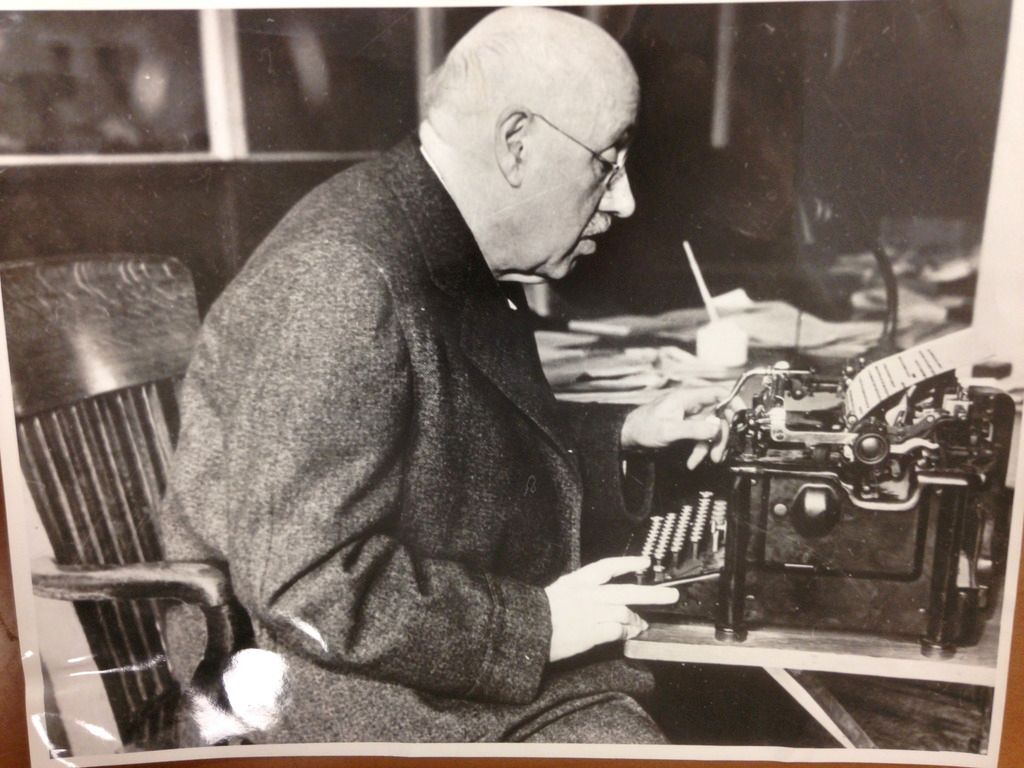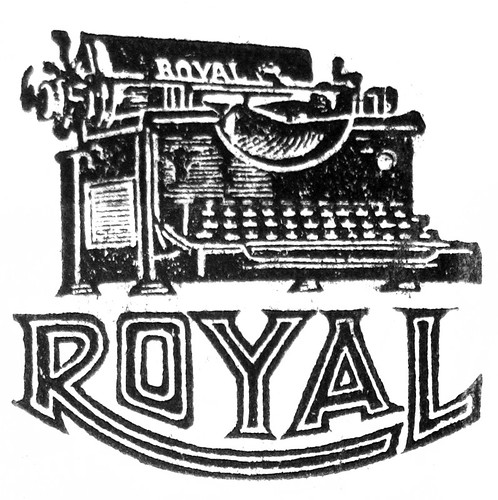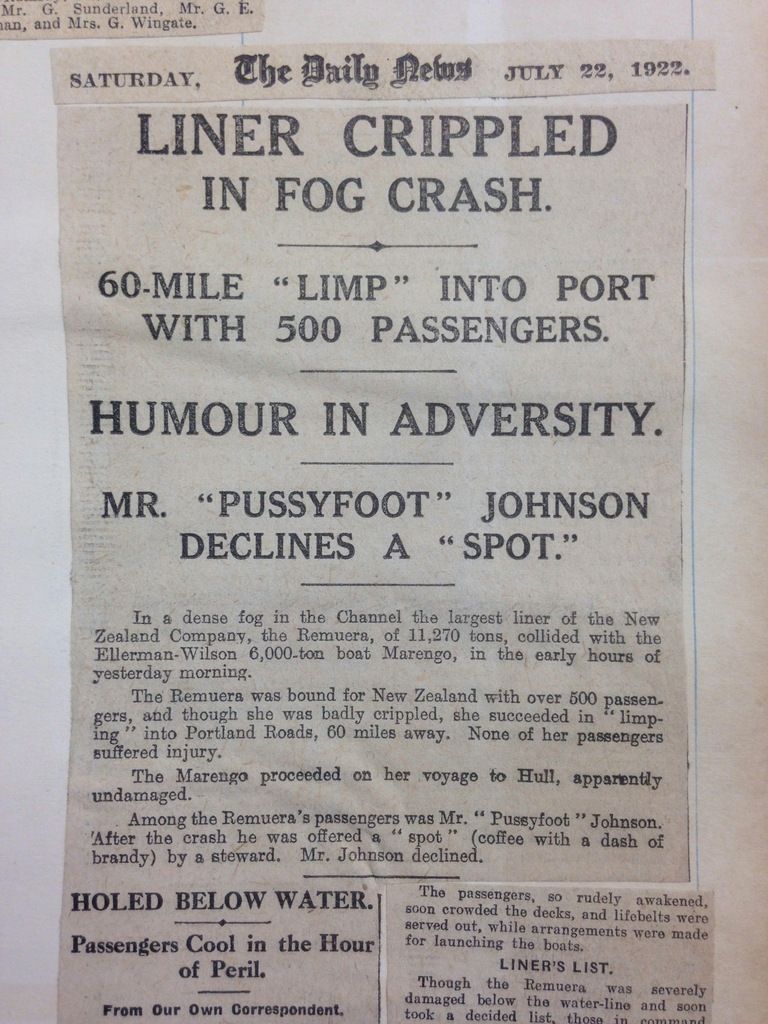
- Markmotown
- Touch Typist
 Offline
Offline - From: Villanova, PA
- Registered: 16-12-2015
- Posts: 183
Can You Identify The Typewriter in This Old Photo?
According to the archives, this is the last known photo taken of famed American prohibitionist William E. "Pussyfoot" Johnson. (I'm currently writing a biography of him. Fascinating guy). The photo is circa 1939, though I recall from reading his letters to the Anti-Saloon League during the Great Depression that he needed a new typewriter, since the one he'd been constantly using for 20+ years was becoming difficult for him to continue repairing. So--assembled experts--what typewriter is he using? 
- Uwe
- Moderator
 Offline
Offline 
- From: Toronto, Canada
- Registered: 12-3-2013
- Posts: 4,410
Re: Can You Identify The Typewriter in This Old Photo?
It should be easily identifiable given the number of distinctive features it has such as the decimal tabulator, a left-side drop line space lever, column case supports, and the most telling, the ribbon spool hump in the right side of its case. My guess is that it's a circa 1925 Remington Model 12. I'm not all that familiar with Remington standards from that particular era, but I don't think the Model 10 had an enclosed case. What puzzles me most is the drop line space lever. All the Model 12s that I've seen either had upright levers or right-side drop levers, which is why I'm guessing that this particular machine was a transition model from the lever moving from the right to left side of the machine that existed well after the Model 12's introduction in 1922.
The pronoun I has always been capitalized in the English language for more than 700 years.
- Valiant
- Touch Typist
 Offline
Offline 
- From: Toronto
- Registered: 12-3-2013
- Posts: 153
Re: Can You Identify The Typewriter in This Old Photo?
One thing for sure... it must have had one heck of a juicy ribbon installed. ![]()
"Now is the time for all good men to come to the aid of the typewriter."
- thetypewriterman
- Key Master
 Offline
Offline - From: Leiston, England
- Registered: 29-5-2013
- Posts: 927
Re: Can You Identify The Typewriter in This Old Photo?
I agree with Uwe. I think that it is a Remington Model 12 too. The 10 was an open-frame machine, and the 16, although similar, had a more modern-looking linespace lever. All of these (10, 12 and 16) had just about the most difficult ribbon path imaginable. Must have been sheer hell for a typist to change a ribbon on one of these !
- Uwe
- Moderator
 Offline
Offline 
- From: Toronto, Canada
- Registered: 12-3-2013
- Posts: 4,410
Re: Can You Identify The Typewriter in This Old Photo?
Valiant wrote:
One thing for sure... it must have had one heck of a juicy ribbon installed.
I was fascinated by the visible type on the paper too. And then I figured it out: The photo is reversed. It should be flipped on its horizontal axis, either it was originally developed backwards, or whoever took this photo of a photo reversed it. When you look at it this way, you can see that the line orientation on the typed page makes more sense, but far more importantly, the line space lever is on the correct end of the carriage, which means this machine was probably manufactured between 1922 and 1927. 
The pronoun I has always been capitalized in the English language for more than 700 years.
- TypewriterGuy
- Typewriter Talk Vet
 Offline
Offline 
- From: United States
- Registered: 24-4-2015
- Posts: 1,250
Re: Can You Identify The Typewriter in This Old Photo?
Thats a Remington 12, as others have stated.
Back from a long break.
Starting fresh with my favorite typer. A Royal Futura!
- Markmotown
- Touch Typist
 Offline
Offline - From: Villanova, PA
- Registered: 16-12-2015
- Posts: 183
Re: Can You Identify The Typewriter in This Old Photo?
Holy crap! That's some top-notch sleuthing! Thank you for your input, everyone. It never dawned on me that the photo might have been reversed. So I've spent all of my efforts looking for that telltale hump on the right and the lever on the left instead of the other way 'round! Thank you.
- •
- Uwe
- Moderator
 Offline
Offline 
- From: Toronto, Canada
- Registered: 12-3-2013
- Posts: 4,410
Re: Can You Identify The Typewriter in This Old Photo?
Markmotown wrote:
I've spent all of my efforts looking for that telltale hump on the right and the lever on the left instead of the other way 'round! Thank you.
Just a FYI, but the hump is on both sides of the machine. It was just the line space lever that didn't make sense to me.
The pronoun I has always been capitalized in the English language for more than 700 years.
- Markmotown
- Touch Typist
 Offline
Offline - From: Villanova, PA
- Registered: 16-12-2015
- Posts: 183
Re: Can You Identify The Typewriter in This Old Photo?
Okay, truth be told, I hadn't gotten THAT far into my own research yet--on the make of the typewriter, at least. ![]()
But a Remington 12 from 1922-1927 DOES completely jive with the timeframe. See, amongst so many of his life's adventures, Mr. Johnson was on the ill-fated ocean-liner, Remuers, which was rammed in fog in the English Channel in July, 1922, which apparently destroyed his typewriter, necessitating the purchase of a new one.
Here's his quote from the archives: We sailed in July, 1922, headed for New Zealand, via the Panama Canal, but the trip was short-lived. On the first day, we barged into a thick fog, sailed along blindly and came to grief at midnight, when the British liner Marengo rammed us amidships. My cabin was beside the dining salon and it was just there that the Marengo stuck her snub nose into the Remuera’s vitals, crashing directly into my cabin, quite as if she had some personal grievance against me. The crash sent me sailing out of my berth and I sprawled on the floor in the midst of the most complete mess of wreckage imaginable. The stateroom was reduced to twisted, splintered ruin. Not even my typewriter had escaped; it was irreparably crushed. But I scrambled to my feet without a scratch. Five hundred and sixty-three passengers in various stages of dress and undress were scurrying for the deck, adjusting life belts as they went, but good British seamanship prevented any further disaster. Watertight bulkheads slipped smoothly shot, blocking out the torrent of water which was rushing through a six-foot rent in the ship’s side, just before the water line. The ship’s band bobbed up from nowhere and strains of jazz music floated out over the sea. Across the badly listed decks came cool, reassuring stewards, with cups of steaming, hot coffee, into which a stiff jolt of brandy had been injected for good measure. The passengers gulped down “the spot” and felt much better about it all. The only really frightened person on the ship was my cabin steward. “I can’t swim,” he wailed, wringing his hands, “and everything I have on earth is on this ship—the savings of a lifetime!” “How much have you saved?” I asked him. “I have nearly ten pounds,” he moaned. “How much do you lack of having ten pounds?” “I lack only ten shillings.” “Here are the ten shillings, then,” I said, handing him the coin. “We are all going to die anyhow, so it makes no difference who has the money.” I’m afraid he didn’t appreciate the joke. He appreciated the money, however, for he promptly stowed it away in his pocket and I suppose the wreck was quite a financial success for him, after all. 
- •

 1 of 1
1 of 1